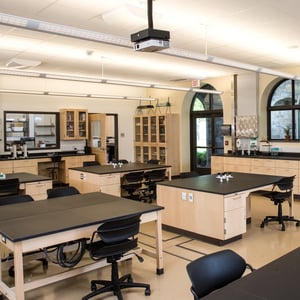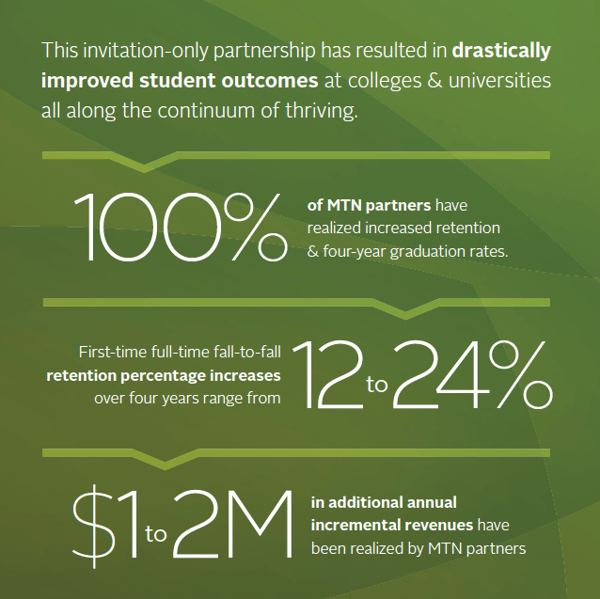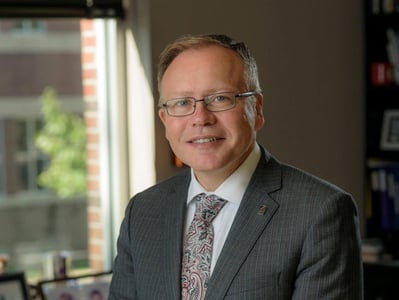
February 26 2019
Photo of Wilson College's Complex for Science, Mathematics, and Technology. Architecture & renovation designs by Credo Design Architects. Full project details here.
Think of family members, friends, and coworkers who have demonstrated that they could attain amazing heights and unlock enormous talent but struggled to do so within the constructs of a formal education. Some of the most transformational, innovative minds of our era—Steve Jobs, Bill Gates, and Mark Zuckerberg, to name but three—dropped out of college and built new worlds in their garages and living rooms that have created, in large part, the world of technology in which we now live, and to which we as educators must now respond. The irony is not lost on us. These individuals, like so many of our students, have innate potential that often cannot be unleashed in a traditional classroom setting.
The hundreds or thousands of students we welcome to our campuses each year are each unique, with different ways of interacting, communicating, and thinking. Through exhaustive ongoing research into human genetics and brain development, we know that they, like all people, process information, absorb concepts, and commit knowledge to memory differently. Despite all their rich and valuable differences, we bring these students together into classes most often oriented around one way of digesting information, with a professor in front of the classroom imparting his or her knowledge. We then measure the students’ success based largely on whether they can adapt to that singular mode of learning.
The challenge before us as educators committed to the success of our students is to rebuild our instructional models and learning spaces around the learner’s vantage point rather than our own. To do this, we must draw on what we can explore about the way different individuals approach learning, utilizing a foundation of integrated, accessible data that allows for rich and timely student support. The information and tools to undertake this rebuilding are readily available. While the work is complex and requires culture change, this transformation is urgently needed: the students of the future will rely on us to meet them as they are, not as we are.
The new university’s responsibility is twofold: first, it must adapt the role of faculty and the learning spaces in which they teach to a new reality of how information and knowledge flow through the world; and second, it must include the student as not only an active participant, but also a co-creator of their own learning experience.
The Student at the Center: Transforming Learning for the Future Challenge Questions
- Does your institution have a student success center?
- Are there learning designers employed at your institution?
- Have you started a digital initiative at your institution?
- Do more than 50 percent of your professors teach in lecture format?
- Have you refreshed and revitalized your core curriculum in the last five years?
Moving the Needle is how Credo approaches integrated, holistic student success and retention work. This two-year partnership engages the full campus community in developing,
Are you enjoying this blog series? If so, you can get the complete text behind the blog by ordering "PIVOT: A Vision for the New University." Go beyond excerpts and get the full story by ordering your copy today!
© Credo and www.credohighered.com, 2018. Unauthorized use and/or duplication of this material without express and written permission from this site’s author and/or owner is strictly prohibited. Short excerpts and links may be used, provided that full and clear credit is given to Credo, Credo Press, and www.credohighered.com with appropriate and specific direction to the original content. Please email info@credohighered.com for information on how to obtain a full copy of Pivot: A Vision for the New University or for permission to use excerpts from the book and/or blog series.
Related Blog Posts
Recent Posts
- Richard Dunsworth, J.D., To Receive 12th Annual Courageous Leadership Award December 16 2024
- Meet the 2024 Credo Values Award Recipients August 27 2024
- What is Executive Coaching, Really? June 25 2024
- Credo & The Constructive Dialogue Institute Announce A New Partnership For Higher Education Leadership Development March 7 2024
- Celebrating Women And Gender-Diverse Learners & Leaders February 28 2024
Categories
- Strategy
- Leadership
- Student Success
- Student Success & Retention
- Enrollment
- Pivot
- Strategic Planning
- Leadership Development
- News
- Strategic Enrollment
- Campus Planning and Architecture
- Moving the Needle
- Data
- Research
- Retention
- Campus Master Planning
- Enrollment & Financial Aid
- Academic Programming
- Campus Planning
- Thriving
- Admitted Student Research
- Architecture
- Finance
- Advising
- Admissions





